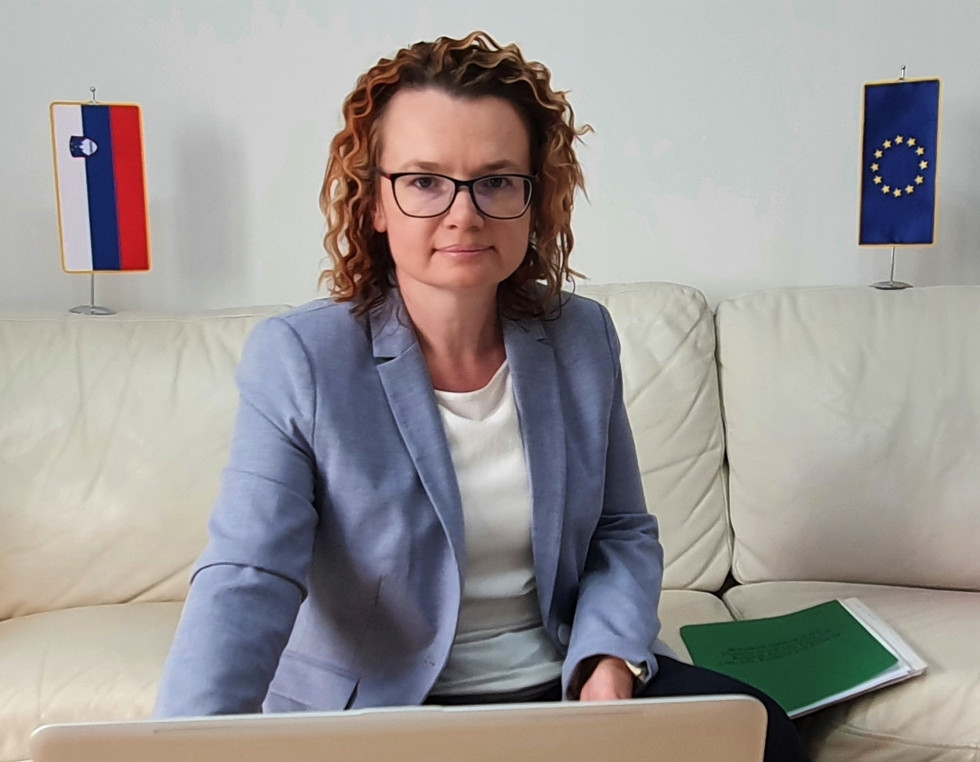State Secretary mag. Monika Kirbiš Rojs took part in a videoconference with Cohesion Ministers of the Visegrad Group (V4), Bulgaria, Romania, Slovenia, Latvia, Lithuania, Estonia, the representative of Croatia and the EU Commissioner for Cohesion and Reforms Elisa Ferreira. Participants reaffirmed the importance of Cohesion Policy in addressing the socio-economic impact of the COVID-19 pandemic.
The ministers shared views on the package of measures proposed by the European Commission to address the negative impact of the COVID-19 pandemic and boost the transition of EU into a green, digital, innovative, fair and sustainable society.
State Secretary Kirbiš Rojs welcomed the proposal for a major recovery plan that was put forward by the European Commission in the end of May. ”The revamped Multiannual Financial Framework for the period 2021-2027 and the instrument Next Generation EU are an ambitious step in the right direction,’’ stressed State Secretary.
The EU has reaffirmed the potential of Cohesion Policy to address unforeseen emergency situations. Thus, the ministers welcomed the adoption of legislative proposals by the European Commission providing for mobilization of the unused Cohesion Policy funding for the period 2014-2020 to help member states mitigate and address the negative consequences of the pandemic. In this context, Slovenia reprogrammed EUR 275 million in Cohesion Policy funding to mitigate the harmful consequences of the coronavirus outbreak and its economic and social effects.
Participants shared views on Cohesion Policy measures proposed under the recovery initiative REACT-EU that includes EUR 55 billion of additional funds that will be made available to the 2014-2020 Cohesion Policy programmes in 2021-2022 from the Next Generation EU. ‘’Slovenia welcomes the efforts of the Commission to make this funding available already in 2020. In particular, we are pleased to see that member states will be able to decide themselves where to channel that money. Slovenia will make investment in healthcare and social care infrastructure, measures to safeguard the existing jobs and help create new ones, measures to provide support to SMEs and certain measures to help the hard-hit sectors of tourism and culture,’’ explained Ms Kirbiš Rojs. She emphasized that Slovenia similarly welcomed additional EUR 40 billion in funding available under the Just Transition Fund in the period 2021-2024.
The ministers also discussed the proposed amendments to the 2021-2027 Cohesion Policy legislative package. The proposed changes aim to make Cohesion Policy implementation as flexible as possible to ensure that the negative consequences of the COVID-19 crisis will be tackled in the most efficient manner. At the same time, the goal is to establish a flexible implementation mechanism that can easily be adjusted for Cohesion Policy to cope with unforeseen emergency situations, while continuing to pursue the set EU development priorities. ‘’It is important that we keep the long-term nature of Cohesion Policy measures to reduce the social, economic and territorial disparities in the EU for the well-being of all EU citizens,’’ concluded Ms Kirbiš Rojs.
The representatives of the participating countries adopted a declaration on common priorities of Cohesion Policy following the COVID-19 outbreak on the initiative of the Czech Presidency of the Visegrad Group. In the declaration, the ministers underlined that the agreement on the next Multiannual Financial Framework and the Next Generation EU should be reached in the shortest time possible, while at the same time being a balanced compromise for the benefit of all member states and their citizens.

